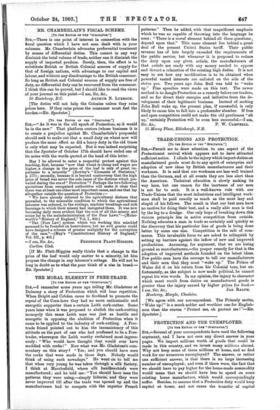TRADE-UNIONS AND PROTECTION.
[To THE EDITOR OF THE "SPECTATOR.") SIR,—Permit me to draw attention to one aspect of the Protectionist revival which appears not to have attracted sufficient notice. I allude to the injury which import-duties on manufactured goods must do to any spirit of enterprise and adoption of new ideas by British manufacturers and their workmen. It is said that our workmen are less well trained
than the German, and at all events they are less alert than
the American. Technical education is slowly making its way here, but one reason for the inertness of our men
is not far to seek. It is a well-known rule with our Trade-Unions that the most industrious and intelligent work- man shall be paid exactly as much as the most lazy and stupid of his fellows. The result is that our beet men have no motive for doing their best, and a really able man is tied by the leg to a drudge. Our only hope of breaking down this
vicious principle lies in active competition from outside.
Nothing educates a man in trade so certainly and quickly as the discovery that his particular line of goods is being done
better by some one else. Competition is the salt of com-
merce. This invaluable force we are asked to relinquish by setting up barriers against the inflow of new and improved
productions. Assuming, for argument, that we are losing ground as manufacturers,—the proper remedy for that is the adoption of improved methods founded on the latest ideas.
Few public men have the courage to tell our manufacturers and their men that they must "wake up." The Prince of Wales did it on his return from his Colonial tour, but un- fortunately, as the subject is now made political, he cannot repeat his wise words. In my opinion, the injury to character which must result from duties on manufactured goods is greater than the injury caused by higher prices for food.—
[We agree with our correspondent. The Princely motto, "Wake up l" is a much nobler and worthier one for English- men than the craven "Protect me, oh protect me 1"—ED. Spectator.]






















































 Previous page
Previous page